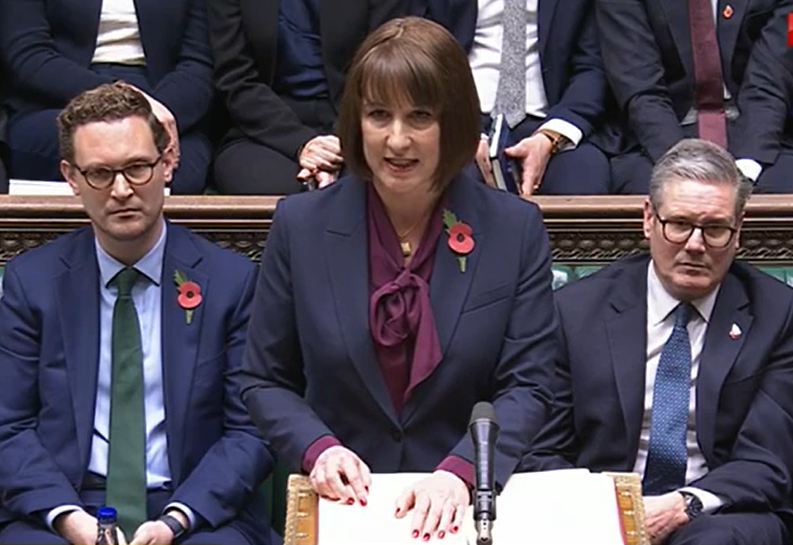Birmingham's business community has delivered its initial verdict on Rachel Reeves' Budget - the first from a Labour Chancellor in more than 14 years.
It has created the highest tax burden on the British people in history, and is the biggest tax-rising Budget for over 30 years.
There is a feeling that, for many employers already operating on tight margins, the increase in National Insurance which will raise £25 billion is likely to prompt a re-evaluation of salary structures and reduce the prospect of future pay rises.
It has also been suggested that some companies may choose to stop sharing employer NI savings on salary sacrificed pension contributions.

Raj Kandola, director of external affairs at Greater Birmingham Chambers of Commerce, said: “There’s no getting away from the fact that businesses will bear the biggest brunt in tax rises as the Chancellor attempted to strike the right balance between maintaining fiscal responsibility and driving business investment.
“Raising the rate and lowering the threshold for employers National Insurance will ultimately hit those employing lower paid workers.
“Coupled with the increase in the National Living Wage and other measures associated with the Make Work Pay agenda, many firms will continue to suffer from crippling cost pressures as data from our latest Quarterly Business Report underlines.
“There were measures announced that will be welcomed by businesses – particular rate relief for those operating the retail, hospitality and leisure industry and a continued freeze on fuel duty. Whether this will be enough to bolster long term business confidence remains to be seen.
“Ultimately, the Chancellor could have gone further to bring down price pressures and encourage firm level investment such as offering a fundamental overhaul of the business rates system and extending the full expensing scheme to leased assets.
“Changing the public borrowing rules seems to have caused very few ripples amongst the bond markets. However, businesses will rightly question the Government’s ability to use this spare capacity to deliver large scale infrastructure given the challenges we’ve seen with HS2 and other key projects over the years – we can only hope the announcements made related to Great British Energy and other green hydrogen projects will kickstart investment and create jobs.
“Nevertheless, it was pleasing to see the Government commit to deliver HS2 to London Euston – we can only hope they take the pragmatic step of safeguarding the land beyond Birmingham to Manchester in order to revisit this part of the project when the fiscal picture improves.”
Lyle Bignon (pictured), Night Time Economy Ambassador for Birmingham, said the Autumn Budget statement appeared to be 'an act of wilful vandalism' as far as the UK's fifth-biggest industry, the Night Time Economy, is concerned.
“Rather than delivering the change, renewal, and investment promised, Rachel Reeves has instead directly snubbed small and medium-sized businesses working in culture, hospitality, and the NTE across the country.

"As we saw from Starmer’s speech in Birmingham earlier this week, today's announcement and the Cabinet's failure to engage with the NTE in any meaningful way to date, we can only assume that the Government is intentionally ignoring our plight.
“A penny off our pints and move to a 40% business rate relief from 75% is tokenistic at best, and offensive at worst. The irony of the PM enjoying hospitality at our arenas and stadiums yet ignoring calls from the industry has not been lost on us.
“We do, of course, welcome more support for workers via the increase of the national minimum wage, reforms to the Carer’s Allowance, and basic pension changes.This suggests the potential for more disposable income across the country.
“However, without any significant interventions or significant investment to offset the 15% hike in Employers National Insurance contributions and other financial squeezes - today’s Budget essentially condemns our SMEs to a slow and painful death.”
“Closer to home here in the West Midlands, if our recently elected regional mayor has not, or will not, advocate to the Chancellor on our behalf, particularly through Local Growth Plans and integrated funding, the region’s culture, hospitality and NTE industries face no choice other than to withdraw its support.”
Richard Maitland, head of national employment tax at MHA, said companies faced a triple whammy of a rise in employer NICs, minimum wage and no cut in corporate tax this Parliament.
MHA has calculated that average cost of employing someone on the minimum wage is up by 10% with very few levers for employers to pull to mitigate tax increases.
"Whether you agree or not on whether this announcement breaches the manifesto pledge most UK companies won’t really care. What they are facing is a triple whammy of a rise in NICs, a significant jump in the statutory minimum wage (impacting some employers) and no prospect of a cut in corporate tax during this parliament.
"Compounding this impact is that there are very few levers that employers can now pull to seek to mitigate these cost increases – although maximising the use of salary sacrifice may be one. Offering some comfort for qualifying smaller businesses is the increase in the Employment Allowance, which will allow them to reduce their annual Employer NIC bill by £10,500, up from £5,000.
"The news today follows hot on the heels of the government’s recently announced employment rights reforms which it has been estimated will cost businesses up to £5bn a year with the impact concentrated on low-paying sectors such as hospitality.
"Clearly the Government will be hoping that the public will understand that the fiscal gap had to be filled somehow and as tax advisers we see why the NIC increase for business was chosen to do much of the heavy lifting in terms of revenue raising. It’s relatively easy to introduce and will probably be accepted by many as the least worst option.
"But this big increase in the cost of employing people and creating new jobs sits uneasily with the laudable government focus on long term economic growth and is likely to give potential future investors concerns about coming to the UK."
Paul Bassi, director of Asha’s Restaurant & Cocktail Bar in Newhall Street, (pictured), said: “The help offered to retail, hospitality and leisure businesses on business rates is completely outweighed by the increase in the minimum wages and Employers’ NI.
“All of which will result in increased prices, meaning inflation, leading to higher interest rates. Less investment will mean fewer jobs meaning lower taxation raised. Reduced profits will also mean less tax raised.

“The IHT changes will result in fewer businesses being handed down from generation to generation, and business taking short term, and non-generational/long term decisions. I predict this will mean a lot of talented people moving abroad – making those countries more prosperous.”
Chris Barlow, head of manufacturing at MHA, said: "There were winners and losers in the manufacturing industry
"There was further formalisation on the commitment to introduce an industrial strategy which also includes SMEs and significant spending commitments for aerospace, automotive and life sciences. Hopefully, this will encourage much-needed overseas investment that the UK manufacturing sector requires to allow it to grow to its full potential.
"The announcement on a further commitment to skills has come as welcome news. The shortage of skills has been a perennial Achilles heel for manufacturers for years. It is hoped that this will plug the widening skills gap that the manufacturing industry faces.
"However, employers have been hit. The increase in employer National Insurance contributions and the significant rise national minimum wage will have a knock-on effect and therefore have a considerable impact on businesses.
"There were some real missed opportunities. There were no changes to R&D or capital allowances. The former is a real missed opportunity (the new regime is too hard when looking at relief for smaller entities). Capital allowances already work relatively well.
"There were no changes announced to corporation tax which is still relatively high compared to our Irish neighbours. There were also no announcements on dealing with Europe post-Brexit which remains a significant challenge for manufacturers particularly when it comes to challenges with supply chains."
Robert Marchant, partner, National Head of Tax at Crowe, said: “The Chancellor talked of “restoring stability” and an “end of short termism”. Businesses need certainty in order to plan their investments and the Business Tax Roadmap needs to provide this to allow our businesses to grow. We know the corporate tax rate will be capped at 25% but that means little if there is constant change to the calculation of the amount on which tax is due. The Budget speech will get the headlines but the key detail that really matters for tomorrow could be in this document.
“We are heading to Scandinavia... Today’s Budget announced £40bn of tax increases likely pushing the UK’s tax burden ever closer to the levels of those in countries such as Denmark and Norway, which funds extensive public services and welfare benefits.
“The Government recently issued its Industrial Strategy which set-out 8 growth driving sectors and includes a desire to ’capture a greater share of internationally mobile investment’’. It is a document that contains a significantly more upbeat tone and could serve as a roadmap to economic growth. The hope is that the measures in today’s Budget, combined with the government’s day to day policy, is able to deliver on these objectives.
“The world’s worst kept secret is out. Tax rises in the order of £40bn have been announced, and, in my opinion if not directly, at least indirectly, they will be borne by everyone, including working people.”
Matt Buckingham, Practice Lead for Grant Thornton UK LLP in the Midlands said: “It was big speech, which demonstrated the scale of the change of strategy that came with the new government. The Chancellor herself acknowledged a series of ‘difficult’ decisions on tax – measures that will certainly grab the headlines – but there are plenty of other eye-catching points.
“It is of course pleasing to hear talk of national renewal and a commitment to invest in critical areas such as housing and transport, along with extra support for sectors such as automotive that are key to the Midlands. Our region is a very strong investment proposition, with an economy worth £108 billion with dynamic sectors such as advanced manufacturing, and digital technologies all retaining enormous potential. The West Midlands is also a strategic location as a logistical hub that fulfils and important role within UK Plc. We’re also home to the UK’s fastest growing tech cluster.
“Stimulus can come in many forms but getting Britain building again is one of the fundamentals. Living and working in the Midlands, we are very conscious of the population demographic. Birmingham is the youngest major city in Europe. We need a supply of homes and wider regeneration that serves all parts of the community well – so the measures to support house building and especially affordable housing will be applauded, although we still await details on planning reform to speed up the whole process,”
Jacob Cork, at the Birmingham office of TLT, said: "There are important changes to Capital Gains Tax, Inheritance Tax and Stamp Duty Land Tax, and families with business or agricultural assets should be seeking advice urgently.
“CGT rate increases have not been as high as many feared, but take effect from today. Those selling a business will still want to try to complete sales prior to April 2025 to secure the current rates of BADR, which may drive a boost in business sales.
“Business owners and families with farmland will need to review their estate planning, with a significant reduction in the benefits of Business Relief and Agricultural Relief from IHT from Aril 2026. These will remain valuable assets for estate planning, but families should take advice on suitable planning available for them before these reductions come into force. There is a window of opportunity to secure long-term tax benefits provided people are taking high quality advice.”
John Wilmot, CEO, car leasing comparison site LeaseLoco, said: “There will be a collective sigh of relief that Rachel Reeves has opted not to hike fuel duty, avoiding added costs for families already struggling with rising living expenses.
“Higher fuel costs would have made everyday travel, commuting, and essential trips even more expensive, adding further strain to household budgets.
“It’s also a relief for many car owners that Reeves resisted introducing a pay-per-mile vehicle tax, which would have raised costs for those most reliant on their vehicles.”
Debbie Porter, managing director at Destination Digital Marketing, said increasing the minimum wage would ironically be to the detriment of those on the minimum wage.
“Where a business employs minimum wage people, it is usually to fulfil lower skilled jobs, or to give young people with no experience a chance without impacting the overall profitability of the company in order to provide that chance.”